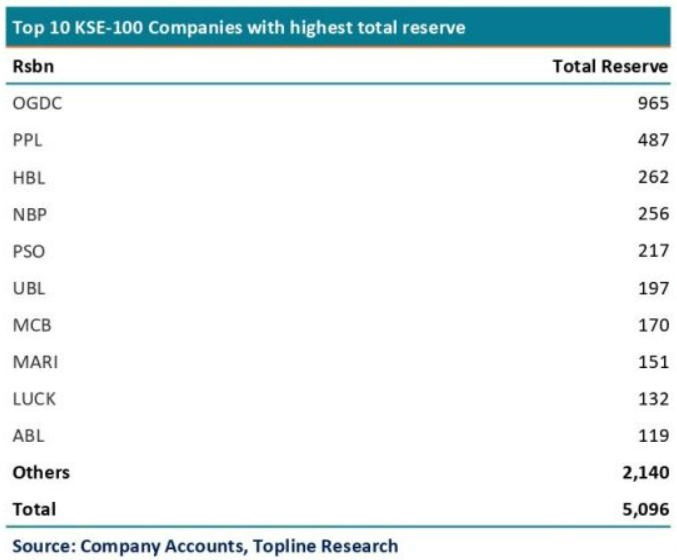
The Pakistani government is preparing for the fiscal year (FY) 2024 budget, and is expected to prioritize debt servicing due to the dire economic straits it finds itself in. To meet the significant expenses that lay ahead, the government is aiming for an ambitious Rs 9.2 trillion tax revenue target for FY24, which would represent a 20% year on year (YoY) growth from FY23’s budgeted numbers.
One proposed tax measure is an advance tax of 5% on listed and 7.5% on unlisted firms on their un-distributed reserves.
“Similar measures were imposed in the late 90s and in 2015 to promote companies to pay more bonus (shares) or dividends. Otherwise, they have to pay higher taxes. This has been a demand of many investors, as large number of listed firms either don't pay a dividend or distribute a low amount,” read a report by Topline Securities.
“The reserves of companies listed at PSX stand at approximately Rs 6.4 trillion. At 5%, this would generate an amount in the range of Rs 300-350 billion for FBR,” the report further added.

As per Amreen Soorani, Head of Research JS Global, “With Federal Budget FY24 to be announced on June 9th, all eyes of the corporate sector are on the proposed income tax of 7.5% to 10% on companies’ accumulated profits by the Reform and Revenue Mobilisation Commission (RRMC), which is reportedly under consideration by the government. Clarity is still awaited on whether, if implemented, the tax application would be linked to payout history (a certain level or record of multiple years), current capital structure (especially debt levels), considering annual or accumulated reserves etc. Some Companies are pre-emptively positioning themselves (incurring material costs in the process) for a possible capitalization of reserves via bonus issue.”

Source: JS Research
The proposed tax measure could have a range of outcomes if implemented. Economist Dr. Ahmed Jamal Pirzada has expressed concerns about the potential negative impact on investments. According to him, if companies do not pay out profits in dividends, those profits are typically invested in short and long-term assets, including government securities. Therefore, he argues that it is misleading to say that the government is simply taxing reserves, as they are also effectively taxing investment and encouraging companies to pay dividends instead. This approach may be counterproductive and could lead to the selling off government securities and other assets, potentially exacerbating the problem. Furthermore, given many sectors are currently experiencing reduced profitability, only energy and power companies and banks remain profitable. Therefore, there may be limited capacity to absorb such a tax intervention at this time.
https://twitter.com/rogueonomist/status/1659849229010096129
However, on the positive side, as per Topline Securities, this can help prop up the PSX. “If these measures are taken this will have positive implications for local bourse that is trading at an unbelievable record low PE of 3x. Listed companies may start announcing big bonuses (which is currently not taxed) or pay large cash dividends.”
Yet, there are concerns that implementing such measures may lead to increased informal economic activity. Economist Ammar Khan, in an article for Profit, argued that Pakistan's saving rates have been decreasing for the past two decades, partly due to a significant proportion of savings being invested in the shadow economy, including real estate and gold markets. These informal investments are often untaxed and outside the purview of regular regulations, making them an attractive option for many. Unfortunately, there have been no reported reforms to redirect these savings back into the formal economy where they can be taxed.
One proposed tax measure is an advance tax of 5% on listed and 7.5% on unlisted firms on their un-distributed reserves.
“Similar measures were imposed in the late 90s and in 2015 to promote companies to pay more bonus (shares) or dividends. Otherwise, they have to pay higher taxes. This has been a demand of many investors, as large number of listed firms either don't pay a dividend or distribute a low amount,” read a report by Topline Securities.
“The reserves of companies listed at PSX stand at approximately Rs 6.4 trillion. At 5%, this would generate an amount in the range of Rs 300-350 billion for FBR,” the report further added.

As per Amreen Soorani, Head of Research JS Global, “With Federal Budget FY24 to be announced on June 9th, all eyes of the corporate sector are on the proposed income tax of 7.5% to 10% on companies’ accumulated profits by the Reform and Revenue Mobilisation Commission (RRMC), which is reportedly under consideration by the government. Clarity is still awaited on whether, if implemented, the tax application would be linked to payout history (a certain level or record of multiple years), current capital structure (especially debt levels), considering annual or accumulated reserves etc. Some Companies are pre-emptively positioning themselves (incurring material costs in the process) for a possible capitalization of reserves via bonus issue.”

Source: JS Research
The proposed tax measure could have a range of outcomes if implemented. Economist Dr. Ahmed Jamal Pirzada has expressed concerns about the potential negative impact on investments. According to him, if companies do not pay out profits in dividends, those profits are typically invested in short and long-term assets, including government securities. Therefore, he argues that it is misleading to say that the government is simply taxing reserves, as they are also effectively taxing investment and encouraging companies to pay dividends instead. This approach may be counterproductive and could lead to the selling off government securities and other assets, potentially exacerbating the problem. Furthermore, given many sectors are currently experiencing reduced profitability, only energy and power companies and banks remain profitable. Therefore, there may be limited capacity to absorb such a tax intervention at this time.
https://twitter.com/rogueonomist/status/1659849229010096129
However, on the positive side, as per Topline Securities, this can help prop up the PSX. “If these measures are taken this will have positive implications for local bourse that is trading at an unbelievable record low PE of 3x. Listed companies may start announcing big bonuses (which is currently not taxed) or pay large cash dividends.”
Yet, there are concerns that implementing such measures may lead to increased informal economic activity. Economist Ammar Khan, in an article for Profit, argued that Pakistan's saving rates have been decreasing for the past two decades, partly due to a significant proportion of savings being invested in the shadow economy, including real estate and gold markets. These informal investments are often untaxed and outside the purview of regular regulations, making them an attractive option for many. Unfortunately, there have been no reported reforms to redirect these savings back into the formal economy where they can be taxed.

